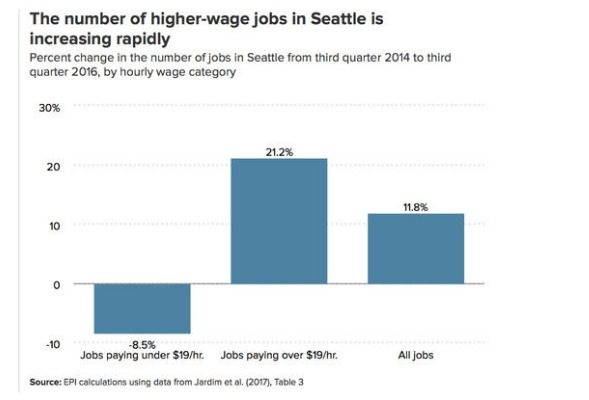Metro Jobs Report: Seattle Minimum Wage, Breaking Up Amazon and More

Let’s dig into the latest job news …
Conflicting Arguments About the Seattle Minimum Wage
A new report from the University of Washington presented potentially difficult news to advocates of higher minimum wage standards. The study found that while the wage increase improved pay-rates, it ended up resulting in diminishing hours. Statistically, Seattle workers impacted by the measure saw a 9 percent decrease in hours per month—a loss of around $125.
Mark Long, one of the research authors, notes, “If you’re a low-skilled worker with one of those jobs, $125 a month is a sizable amount of money. It can be the difference between being able to pay your rent and not being able to pay your rent.”
The data is being taken as a damning argument against rising wages, but goes against a number conflicting reports. Recently, Michael Reich, Sylvia Allegretto and Anna Godoey—researchers from UC Berekeley—reported the opposite. Their study, entitled “Seattle’s Minimum Wage Experience 2015-16,” found that “employment effects in food services, in restaurants, in limited-service restaurants and in full-service restaurants were not statistically distinguishable from zero. These results are all consistent with previous studies that credibly examine the causal effects of minimum wages.”
One of the larger criticisms of the UW paper, which was funded through the city itself, was that it did not include any multi-site fast food chains, according to LA Times reporter Michael Hiltzik. He writes, “This group is among the biggest employers of low-wage workers, accounting for about 38 percent of the workforce, so its absence leaves a big gap. The study’s critics say it’s an especially important gap because chain employers have an easier time adjusting to higher hourly wages and can move workers from one place to another, so UW may have overstated the job losses.”
The UW research does note, however, that despite losses of lower-wage workers, employment rates for those earning $19 or more has ballooned since 2014.

Jacob Vigdor, the lead researcher and public policy professor at UW, also noted that the job increased from other sectors were in line from Berkeley’s data, which found that the job impact in the city was basically net zero, according to ABC News.
Read more about the report and its conflicts here …
It’s Time To Break Up Amazon | Fast Company
In case you missed it or just can’t muster enough attention to care about grocery store acquisitions, eCommerce monolith Amazon recently purchased upscale grocery store chain Whole Foods for a projected $13.7 billion. The sale means another monopoly-like joint venture is creeping into ever-present reality, one that the New Yorker likens to an off-shoot plot from Black Mirror.
Fast Company writer Douglas Rushkoff is, in a word, worried. He notes that Amazon’s grasp “now generates 30 percent of all online and offline retail sales growth in the United States, and already controls 40 percent of internet cloud services, has reached too far.” His comparative negative reaction puts Amazon in the conversation with Wal-Mart, the nation’s largest independent employer.
The problem is, when an existing market is merely a means to another end, the company doesn’t consider the long-term effects of its actions. Amazon treated the book industry the same way companies like Walmart once treated the territories into which they expanded: Use a war chest of capital to undercut prices, put competitors out of business, become the sole employer in the community, turn employees into part-time shift workers, lobby for deregulation, and effectively extract all the value from a given region before closing up shop and moving to the next one.
Rushkoff rounds out his concerns noting that despite increases in worker productivity and the rapid scaling of large companies, the art of extracting an actual profit is proving to be more difficult than one may assume.
Check out Rushkoff’s entire piece here …
Choose Between Work-Study, Part-Time Job in College | U.S. News
With potential budget cuts to the federal work-study program, which helps college students work on campus while attending school, utilizing a traditional part-time job may serve as a better use of time. A new piece from U.S. News & World Report finds that typical work-study programs are a bit rigid because of organizational structure and government funding. Working off-campus offers more flexibility with earnings and different types of positions. However, typical on-campus jobs allow students to work more and usually allow more time off for studies, so those differences need to be heavily considered.
Find out which works better for you here …
What The Latest Jobs Report Means For Your Job Search | Forbes
Unemployment in the U.S. is at the lowest rate in 16 years, but not everything in the national jobs report is rosy. Forbes reports that, “Overall, job growth is solid, although it’s not quite where it needs to be. The economy needs at least 150,000 new jobs added each month to keep expanding, and there were only 138,000 new jobs added last month. So the numbers aren’t quite meeting the threshold that we need, but they’re close.”
Certain industries, such as government positions and retail, are rapidly shrinking, “but jobs in health care, hospitality, mining and business/professional services increased.” As well, demand remains high and the growing number of Baby Boomers retiring means more opportunities for younger workers and (cough) MBA grads.
